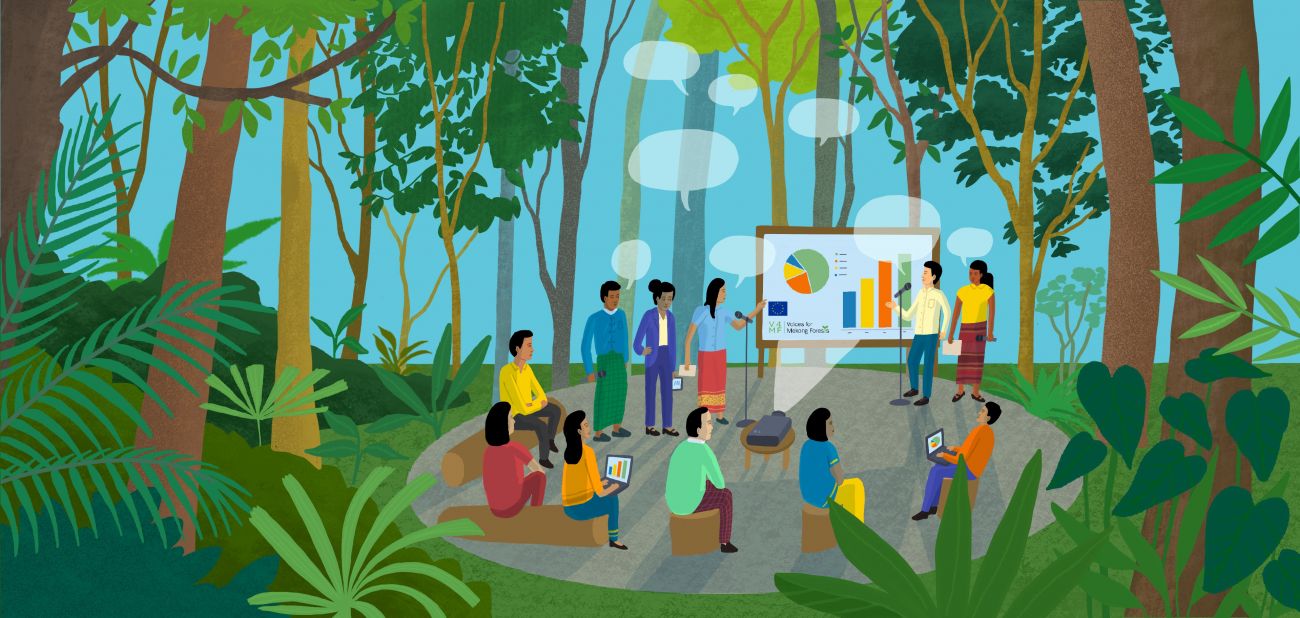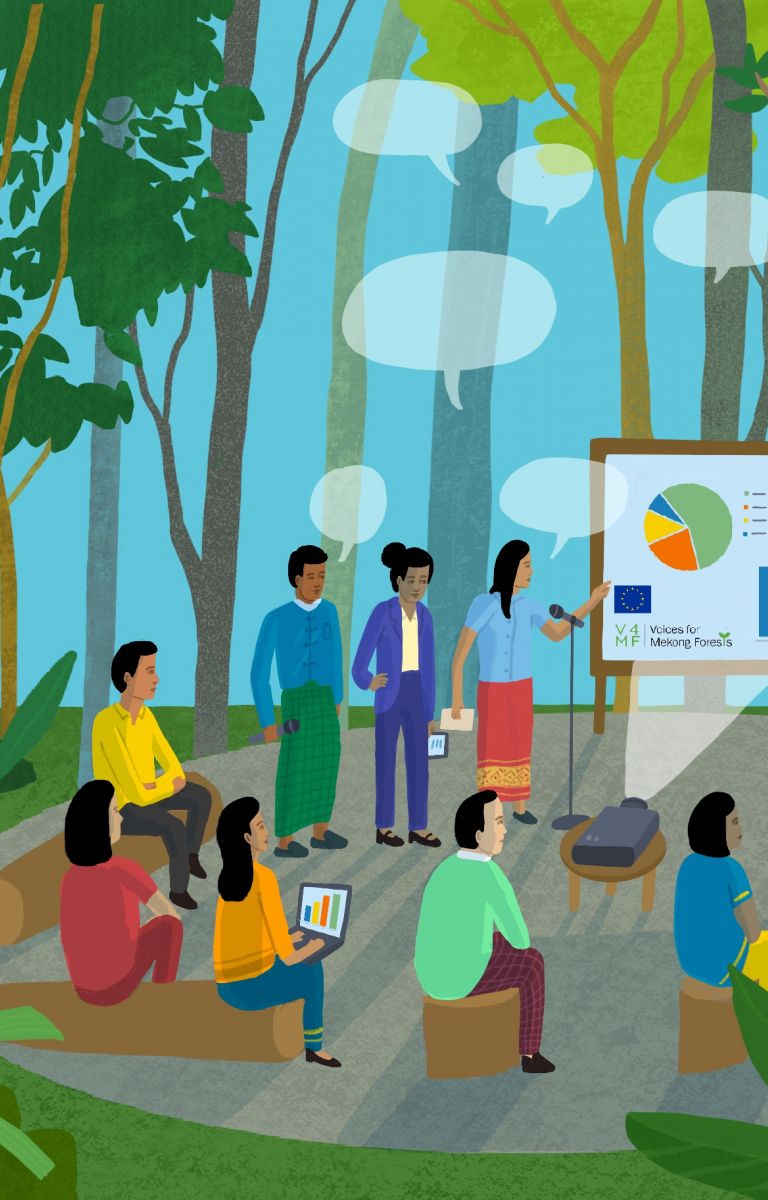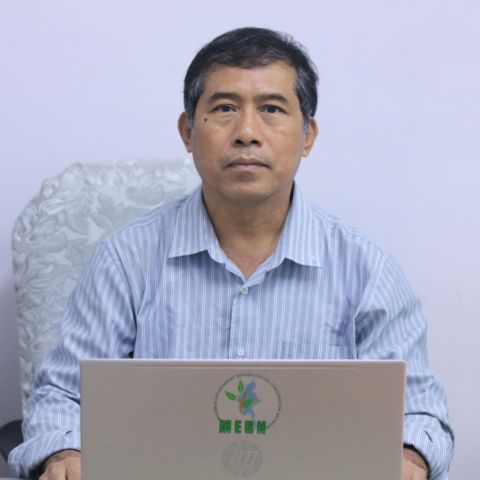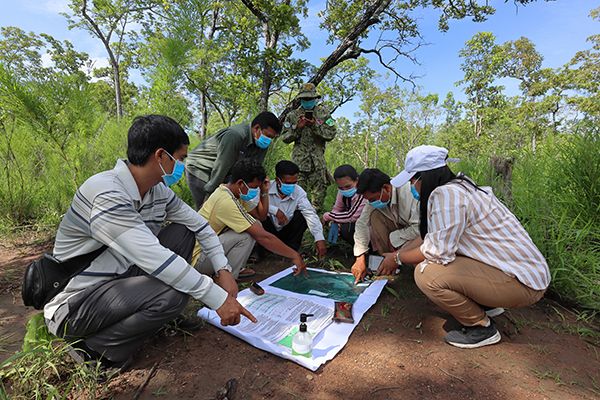

Imagine waking up one day and being told you no longer have a right to live in the village where you, your parents and even your grandparents were born, because decision-makers in a distant city had allocated the land as a national park. Or imagine being told you can’t use timber from trees you have planted in your own garden. Imagine feeling powerless when a logging company arrives in your area and says that it, not your community, has rights to the trees there.
Voices for Mekong Forests (V4MF) is an EU-funded project that aims to strengthen the participation of non-state actors in forest landscape governance. RECOFTC leads the project in partnership with WWF-Greater Mekong, the East West Management Institute-Open Development Initiative (EWMI-ODI), Preferred by Nature, the NGO Forum on Cambodia, the Lao Biodiversity Association, the Myanmar Environment Rehabilitation-conservation Network (MERN), Raks Thai Foundation and People and Nature Reconciliation (PanNature).
The EU’s support for V4MF is part of its wider promotion of sustainable forest management and biodiversity conservation. Its commitment to strengthening the role of non-state actors in forest governance aligns well with best practices arising from the EU Forest Law Enforcement, Governance and Trade (FLEGT) Action Plan on illegal logging and associated trade, and from the UN-led REDD+ initiative, which aims to reduce greenhouse gas emissions from the forest sector in order to help address climate change.
Across the Mekong region of Southeast Asia, problems such as these have long affected communities that depend on forests for survival and are often already marginalized and living in poverty. But in recent years, the governments of the Mekong countries have increasingly listened to the concerns of communities and civil society organizations (CSOs) that represent their interests. These governments have started to let civil society groups provide input as they reshape policies and laws governing forests.
In Thailand, for example, lobbying by CSOs led to changes to the Forest Act, which now stipulates that people can at last use timber grown on land that they own. Thai CSOs also shaped Thailand’s 2019 National Park Act, giving recognition to the rights of communities in conservation forest areas to obtain a licence to live there and use forest resources.
“The opportunity for local communities to claim land in national parks arose because civil society organizations raised their voices,” says Robin aus der Beek, coordinator of the Voices for Mekong Forests (V4MF) project at RECOFTC. “In fact, there have been many revisions of policies and laws related to forestry and natural resource management in recent years in Mekong countries. Civil society organizations have had quite an influential role there.”
Although there are many examples of progress, more is needed to build on these successes and overcome entrenched issues. This special report explores why participation matters, how it is happening, what challenges prevent more effective participation and how to overcome them.
Why participation matters
One key argument for participation is that policies and laws are more likely to be effective if the people they affect have a say in their design. Indeed, the act of developing policies and laws in a participatory way can bridge gaps among groups with diverse and often conflicting interests, leading to sustainable results.
Traditionally, though, governments have set the agenda on their own. Where does that leave micro- and small-scale enterprises, Indigenous Peoples and civil society groups?
Too often, the answer has been “on the outside”. Now though, there is plenty of change underway in Mekong countries.
As well as influencing Thailand’s new Forests Act and National Parks Act, civil society groups there have had a say in processes related to national laws on community forestry, and international initiatives on illegal logging and on the role of forests in mitigating climate change.

In Myanmar, the government is increasingly coordinating and cooperating with civil society organizations on policy and legal reforms.
Aung Thant Zin
In Myanmar the government is increasingly coordinating and cooperating with civil society organizations on policy and legal reforms, says Aung Thant Zin, chief executive officer of the Myanmar Environment Rehabilitation-conservation Network. He lists recent participation by such organizations in the development of the National Land-use Policy and the National Climate Change Policy, the revision of Forest Rules and Community Forestry Instructions, and in the development of the Protection of Biodiversity and Protected Area Law.
Hoang Xuan Thuy, vice-director of the Vietnamese nongovernmental organization PanNature, says Vietnam has also become more open in recent years. Now, when government agencies develop a new policy or law, they seek the views of relevant stakeholders and the wider public, he says.
“When they have a draft, they put it online and anyone can download it, organize a consultation and provide comments to the government agency,” says Hoang. “When the government agency submits the draft law to the National Assembly for approval, they need to provide what feedback they have received and explain what they have taken into account and what they have not. They publish that on their website as well. These requirements provide room for engagement.”
To influence policy processes, PanNature will often organize consultation workshops to gather the views of forest stakeholders, or will join technical working groups set up by government agencies to help them develop policies.
“For revisions of the law, government agencies will invite different organizations to discuss what they should revise, what gaps to fill and what research they need to do to develop policy,” says Hoang. “When Vietnam developed its new Forest Law of 2017, we successfully advocated for the law to recognize sacred forests managed by communities.”
Robin aus der Beek says that by engaging with civil society groups and learning what they know, governments are starting to shift. Before, they focused on engaging communities in forest conservation and allowing them to use forest resources for subsistence. But now they are promoting livelihood development and income generation from the forest sector.
“This overall trend and the resulting increase in community rights is due to participation by civil society groups,” he says.
The next sections of this special report focus on how civil society organizations are participating in policy processes and the challenges they face.

